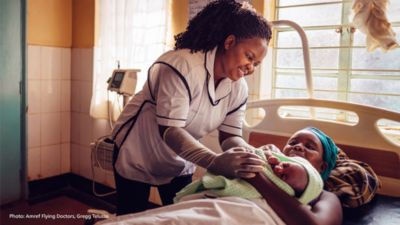10 things to know about global access to healthcare
- Nov 29, 2022
- 6 minute read

By the Philips Editorial Team
About the author
A team of writers, editors and visual designers covering the latest trends and developments in healthcare, focusing on the role of innovation, design and sustainability in improving health outcomes.
According to the World Health Organization (WHO), up to 3.5 billion people – almost half the world’s population – lack access to the health services they need, with almost 100 million people being pushed to extreme poverty each year because of out-of-pocket expenses [1]. And COVID-19 has only intensified this situation, disproportionally impacting underserved and marginalized populations, worsening existing health disparities, and forcing vulnerable people into even more precarious positions [2].

The pandemic also stalled progress towards Health For All, the collective effort to ensure all people can access healthcare by 2030 (a commitment made by United Nations member states). No one should get sick and die because they can’t get the health services they need, but without drastic action, the WHO estimates that by 2030, up to 5 billion people will be unable to access healthcare.
Here are 10 important things to know about the fight to expand global healthcare access:
1. Health is a human right
Since 1946, the right to health (including basics like access to care, safe drinking water, and adequate housing) has been internationally recognized as a fundamental human right. Yet sadly, achieving Health For All in the midst of climate change, the rise of chronic disease, unprecedented migrations and other global challenges is more difficult than ever. Health For All will require shared goals and large-scale collaboration. The 17 global ambitions represented in the United Nations Sustainable Development Goals (UN SDGs) serve as both an urgent call for action and a collective ‘blueprint’ for a better future.
2. Health For All is not possible without a healthy planet
Beyond UN SDG 3: ensuring healthy lives and promoting well-being for all, the UN SDGs explicitly recognize that for people to thrive, they need to live in a clean world. UN SDG 12 and 13, for example, advocate for responsible production and consumption and climate action, respectively. The UN recently declared that a healthy and sustainable environment is a human right. Efforts to promote good health for all people cannot ignore the health of our planet.

3. Social determinants have big impacts on health
The food we eat, water we drink, and air we breathe play a large role in our overall health. Not to mention the houses we live in and the education we receive. These social determinants are major drivers of global health inequities [4], which are only worsened by geopolitical conflicts, climate events and disease outbreaks. In addition to innovating solutions that help bring quality care to underserved communities, Philips works with governments and other public and private partners in the countries we operate in to address broad social issues (e.g. human rights and climate change) and provide support to people during global crises (e.g. COVID-19 and the war in Ukraine).
4. Primary care is key to building resilient health systems
Capable of managing 90% of healthcare demands[5], primary care is a cost-effective way to address comprehensive health needs – from disease prevention and treatment to rehabilitation and palliative care – early and close to home.[6] Primary health care is key to strengthening health system resilience and widely regarded as the most inclusive and equitable way to achieve Health for All.[7] Given the myriad crises testing healthcare adequacy and resilience, there is a pressing need to re-think primary care delivery. That means utilizing digital and virtual care enablement and developing models that connect public and private resources, engage communities, and extend the reach to the last mile.
5. Impact financing is a critical enabler
Funding is often a barrier to building resilient health systems, especially in underserved areas. Private-sector companies can play a catalytic role in mobilizing funding by working with organizations like the Health Finance Coalition and partnering with impact investors like Invest International to finance healthcare projects. As an investor in the Medical Credit Fund 2, Philips is helping provide financing to healthcare providers across Africa. Social impact investment vehicles, like Philips Foundation Impact Investments B.V., can help support promising health initiatives in overcoming funding gaps. Working with an expanding network of funding partners committed to building strong health systems through sustainable, scalable digital solutions and new business and financing models helps enable large-scale social impact.

6. Mother and child health is essential for global health
Globally, more than 800 women die every day from causes related to pregnancy and childbirth [7], and in 2020, roughly 13,800 children under five died every day [8] – deaths that are largely preventable. Furthermore, clinical studies point to the connection between adult likelihood of disease and in utero and early life conditions [9]. By identifying high-risk pregnancies earlier, expanding access to clinical care and monitoring, and providing tools to support healthy behaviors, we can help improve maternal and child outcomes and contribute to better health around the world.
7. Digital transformation offers new care opportunities
The digital transformation of healthcare uses the power of new technologies, data, AI, cloud-based platforms, partnerships, and innovative business models to improve health outcomes, lower the cost of care, increase access and improve the human care experience. Making sure no one is left behind requires an equitable approach that promotes access to care for all. In remote and rural settings, telehealth, in particular, holds great promise for increasing healthcare access. Global platforms like the Digital Connected Care Coalition can help accelerate the digital transformation of healthcare in low- and middle-income countries.

8. Strategic partnerships can produce better outcomes
The COVID-19 response demonstrated that when the right partners unite behind a common purpose and shared sense of urgency, they can deliver incredible results. Collaboration among governments, non-governmental organizations, and other public and private partners helps ensure more appropriate and sustainable healthcare solutions. Shared-value partnerships, like Philips’ longstanding partnerships with Amref Health Africa and UNFPA, leverage private-sector innovation power to make a real impact. Partners with complementary strengths, working closely with those involved in healthcare delivery and the communities served, can together achieve remarkable health outcomes.
9. People-centered health innovations deliver more equitable care
Designing impactful and equitable health technologies starts with listening to patients and healthcare practitioners. Involving the local community in co-creation provides insight into health needs and the barriers people face. A truly inclusive innovation approach calls for ‘radical empathy’, addressing sometimes uncomfortable biases and recognizing the range of factors that contribute to health gaps. There’s no one-size-fits-all. The best solutions keep people at the center of the innovation process, adapting as needs change.
10. Measuring impact helps drive positive change
Commitments aren’t enough. Change requires action and evidence of impact. As part of our purpose, Philips is committed to improving the lives of 2.5 billion people a year by 2030, including 400 million people living in underserved communities. We not only set tangible goals, but we also share the outcomes of our actions. To ensure we remain on track, an externally audited model tells us how many lives have been improved by our products and solutions in a given year. Through (digital) technology and innovation and by working with partners around the globe, Philips and Philips Foundation are helping expand access to quality health services for those most in need.
Join us! Here’s how you can help support Health For All:
As an individual, you can promote UHC Day on December 12 within your organization, share information and resources, and encourage your organization to join UHC2030 as a partner.
Are you part of a private company? The UHC2030 Private-Sector Constituency (UHC2030 PSC) is a platform for private sector entities wishing to exchange and collaborate on universal health coverage. As well, the Digital Connected Care Coalition (DCCC) is a global coalition accelerating the digital transformation of healthcare in low- and middle-income countries, and they are continually bringing on new partners committed to the mission of universal health coverage. The DCCC can help you find partners with complimentary skills. Explore ideas and learnings from current and past projects on Philips Foundation’s Knowledge Hub.
Are you a social entrepreneur with an innovative and scalable healthcare enterprise looking to collaborate? Find opportunities to partner with the Philips Foundation on accelerating high-impact access-to-healthcare solutions. Check out insights and learnings from current and past Philips Foundation projects and activities, and explore new ideas, solutions, or models for scaling access to care in underserved communities at the Philips Foundation’s Knowledge Hub.
Are you an impact investor with a focus on health, particularly in the areas of innovation, digitalization, and maternal and child health? Connect to a broader ecosystem and learn more about Philips Foundation Impact Investments B.V. opportunities.
Sources
Tracking Universal Health Coverage: 2017 Global Monitoring Report, World Bank, WHO. 2017
2022 Global Health Care Outlook, Deloitte. 2021
Countries must invest at least 1% more of GDP on primary health care, WHO. September 2019
COVID-19 and the social determinants of health and health equity, WHO. December 2022
The missing link – the role of primary care in global health, Global Health Action. February 2014
A Vision for Primary Health Care in the 21st Century, WHO, UNICEF. 2018
Under-five mortality, UNICEF. December 2021
Effect of In Utero and Early-Life Conditions on Adult Health and Disease, New England Journal of Medicine. July 2008